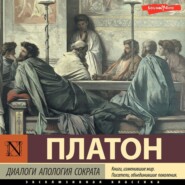По всем вопросам обращайтесь на: info@litportal.ru
(©) 2003-2024.
✖
The Republic
Настройки чтения
Размер шрифта
Высота строк
Поля
But we have not yet brought forward the heaviest count in our accusation: – the power which poetry has of harming even the good (and there are very few who are not harmed), is surely an awful thing?
Yes, certainly, if the effect is what you say.
Hear and judge: The best of us, as I conceive, when we listen to a passage of Homer, or one of the tragedians, in which he represents some pitiful hero who is drawling out his sorrows in a long oration, or weeping, and smiting his breast – the best of us, you know, delight in giving way to sympathy, and are in raptures at the excellence of the poet who stirs our feelings most.
Yes, of course I know.
But when any sorrow of our own happens to us, then you may observe that we pride ourselves on the opposite quality – we would fain be quiet and patient; this is the manly part, and the other which delighted us in the recitation is now deemed to be the part of a woman.
Very true, he said.
Now can we be right in praising and admiring another who is doing that which any one of us would abominate and be ashamed of in his own person?
No, he said, that is certainly not reasonable.
Nay, I said, quite reasonable from one point of view.
What point of view?
If you consider, I said, that when in misfortune we feel a natural hunger and desire to relieve our sorrow by weeping and lamentation, and that this feeling which is kept under control in our own calamities is satisfied and delighted by the poets; – the better nature in each of us, not having been sufficiently trained by reason or habit, allows the sympathetic element to break loose because the sorrow is another's; and the spectator fancies that there can be no disgrace to himself in praising and pitying any one who comes telling him what a good man he is, and making a fuss about his troubles; he thinks that the pleasure is a gain, and why should he be supercilious and lose this and the poem too? Few persons ever reflect, as I should imagine, that from the evil of other men something of evil is communicated to themselves. And so the feeling of sorrow which has gathered strength at the sight of the misfortunes of others is with difficulty repressed in our own.
How very true!
And does not the same hold also of the ridiculous? There are jests which you would be ashamed to make yourself, and yet on the comic stage, or indeed in private, when you hear them, you are greatly amused by them, and are not at all disgusted at their unseemliness; – the case of pity is repeated; – there is a principle in human nature which is disposed to raise a laugh, and this which you once restrained by reason, because you were afraid of being thought a buffoon, is now let out again; and having stimulated the risible faculty at the theatre, you are betrayed unconsciously to yourself into playing the comic poet at home.
Quite true, he said.
And the same may be said of lust and anger and all the other affections, of desire and pain and pleasure, which are held to be inseparable from every action – in all of them poetry feeds and waters the passions instead of drying them up; she lets them rule, although they ought to be controlled, if mankind are ever to increase in happiness and virtue.
I cannot deny it.
Therefore, Glaucon, I said, whenever you meet with any of the eulogists of Homer declaring that he has been the educator of Hellas, and that he is profitable for education and for the ordering of human things, and that you should take him up again and again and get to know him and regulate your whole life according to him, we may love and honour those who say these things – they are excellent people, as far as their lights extend; and we are ready to acknowledge that Homer is the greatest of poets and first of tragedy writers; but we must remain firm in our conviction that hymns to the gods and praises of famous men are the only poetry which ought to be admitted into our State. For if you go beyond this and allow the honeyed muse to enter, either in epic or lyric verse, not law and the reason of mankind, which by common consent have ever been deemed best, but pleasure and pain will be the rulers in our State.
That is most true, he said.
And now since we have reverted to the subject of poetry, let this our defence serve to show the reasonableness of our former judgment in sending away out of our State an art having the tendencies which we have described; for reason constrained us. But that she may not impute to us any harshness or want of politeness, let us tell her that there is an ancient quarrel between philosophy and poetry; of which there are many proofs, such as the saying of 'the yelping hound howling at her lord,' or of one 'mighty in the vain talk of fools,' and 'the mob of sages circumventing Zeus,' and the 'subtle thinkers who are beggars after all'; and there are innumerable other signs of ancient enmity between them. Notwithstanding this, let us assure our sweet friend and the sister arts of imitation, that if she will only prove her title to exist in a well-ordered State we shall be delighted to receive her – we are very conscious of her charms; but we may not on that account betray the truth. I dare say, Glaucon, that you are as much charmed by her as I am, especially when she appears in Homer?
Yes, indeed, I am greatly charmed.
Shall I propose, then, that she be allowed to return from exile, but upon this condition only – that she make a defence of herself in lyrical or some other metre?
Certainly.
And we may further grant to those of her defenders who are lovers of poetry and yet not poets the permission to speak in prose on her behalf: let them show not only that she is pleasant but also useful to States and to human life, and we will listen in a kindly spirit; for if this can be proved we shall surely be the gainers – I mean, if there is a use in poetry as well as a delight?
Certainly, he said, we shall be the gainers.
If her defence fails, then, my dear friend, like other persons who are enamoured of something, but put a restraint upon themselves when they think their desires are opposed to their interests, so too must we after the manner of lovers give her up, though not without a struggle. We too are inspired by that love of poetry which the education of noble States has implanted in us, and therefore we would have her appear at her best and truest; but so long as she is unable to make good her defence, this argument of ours shall be a charm to us, which we will repeat to ourselves while we listen to her strains; that we may not fall away into the childish love of her which captivates the many. At all events we are well aware that poetry being such as we have described is not to be regarded seriously as attaining to the truth; and he who listens to her, fearing for the safety of the city which is within him, should be on his guard against her seductions and make our words his law.
Yes, he said, I quite agree with you.
Yes, I said, my dear Glaucon, for great is the issue at stake, greater than appears, whether a man is to be good or bad. And what will any one be profited if under the influence of honour or money or power, aye, or under the excitement of poetry, he neglect justice and virtue?
Yes, he said; I have been convinced by the argument, as I believe that any one else would have been.
And yet no mention has been made of the greatest prizes and rewards which await virtue.
What, are there any greater still? If there are, they must be of an inconceivable greatness.
Why, I said, what was ever great in a short time? The whole period of three score years and ten is surely but a little thing in comparison with eternity?
Say rather 'nothing,' he replied.
And should an immortal being seriously think of this little space rather than of the whole?
Of the whole, certainly. But why do you ask?
Are you not aware, I said, that the soul of man is immortal and imperishable?
He looked at me in astonishment, and said: No, by heaven: And are you really prepared to maintain this?
Yes, I said, I ought to be, and you too – there is no difficulty in proving it.
I see a great difficulty; but I should like to hear you state this argument of which you make so light.
Listen then.
I am attending.
There is a thing which you call good and another which you call evil?
Yes, he replied.
Would you agree with me in thinking that the corrupting and destroying element is the evil, and the saving and improving element the good?
Yes.
And you admit that every thing has a good and also an evil; as ophthalmia is the evil of the eyes and disease of the whole body; as mildew is of corn, and rot of timber, or rust of copper and iron: in everything, or in almost everything, there is an inherent evil and disease?
Yes, he said.
And anything which is infected by any of these evils is made evil, and at last wholly dissolves and dies?
True.
The vice and evil which is inherent in each is the destruction of each; and if this does not destroy them there is nothing else that will; for good certainly will not destroy them, nor again, that which is neither good nor evil.
Certainly not.

















